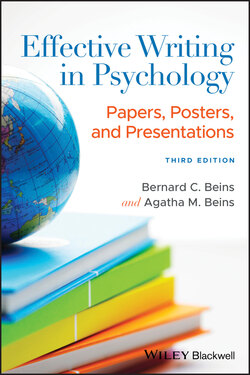Читать книгу Effective Writing in Psychology - Bernard C. Beins - Страница 33
Paraphrase Rewrite
ОглавлениеSenécal et al. (2001) draw from research done by Deci and Ryan (1985 , 1991) for their own work on self‐determination theory, which offers insight into the relationship between human activities and motivation. According to Senecal et al., when choice or pleasure is involved, self‐determination can help explain the motivations behind individuals' activities. Alternatively, “individuals who participate in different activities out of internal and/or external pressures regulate their behavior in a non‐self‐determined fashion” (Senécal et al., 2001 , p. 178).
This example is relatively straightforward and addresses situations commonly encountered in academic research and writing, and in many cases, it is clear how to avoid plagiarism. Nevertheless, there will probably be moments when you are unsure whether you need to cite something or how to cite it. For example, you might not know if your audience considers something to be common knowledge, or you might wonder if your paraphrase is different enough from the original text. When this happens, just ask someone. Your instructor and university librarians will be familiar with the practices that ensure academic integrity in research and writing, so use them as resources.
We encourage you to become familiar with what is and isn't plagiarism not only because it is a form of dishonesty but also because including citations and references can strengthen your work. For example, if you are proposing that people who were spanked as children are more likely to spank their own children, drawing from other psychologists' credible, scholarly research that points to the same conclusion will increase the validity of your stance.
Referencing perspectives that contradict your stance can benefit your work, too. Showing your audience that you are aware of and have evaluated research that presents arguments or conclusions that differ from yours indicates that you have explored multiple perspectives and still consider yours to be the strongest. So, revisiting the spanking example from the previous paragraph, if you were to make an argument about spanking, you could cite studies that do not find a connection between being spanked as a child and then spanking one's own children. Addressing counterarguments may persuade someone who previously disagreed with your stance to reconsider, so through this strategy you might convince more readers of the credibility of your argument. (See Chapter 9 for more information about counterarguments.)
Regardless of the research stage, each time you take notes, you want to be able to connect those notes to a specific source. There are different systems you can use to do this, so find the one that works best for you. For some people, recording a source's complete citation information and then writing notes keeps everything in one place and makes it less likely that either the citation or the notes will be lost or separated. Almost all library catalogs and search engines allow you to email or print citations, and through some article databases you can email or print out entire articles. However, should you email or print citations, you then need to figure out how to connect the citations with your notes about that source. If you will be using a number of sources, programs such as EndNote, Zotero, and RefWorks (which are all reference management software) can help you record your sources and connect them to your notes.
What we want to emphasize, though, is the importance of keeping track of your sources at the initial research phases and throughout your writing project. There are few things as frustrating as knowing you've summarized, paraphrased, or quoted a source but not knowing which source it is, which causes you to spend time reading through articles or even revisiting the library to get a source you had already returned. Therefore, practices that support academic integrity not only may prevent plagiarism—intentional or unintentional—they may also be more efficient in the long run.
